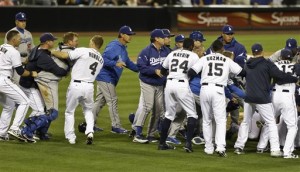A wild pitch by Los Angeles Dodgers pitcher Zack Greinke hit San Diego Padres outfielder Carlos Quentin on the arm during the bottom of the sixth inning of their game Thursday night. Following the errant pitch, Quentin charged the mound, resulting in a dugout-clearing brawl.
As a result of the brawl, Greinke broke his collarbone and Dodgers outfielder Matt Kemp continued the tirade until a second brawl broke out. Four players, including Greinke, Quentin and Kemp were all ejected from the game. The Dodgers won the game 3-2.

In an online article by Joe Lemire of Sports Illustrated, the danger of rushing the mound is called into question, an event that has been an occurrence too often seen by baseball fans everywhere.
Late Thursday night we were reminded that there’s another baseball happenstance — perpetuated by precedent, though certainly not by the rules — that should be done away with. Fighting doesn’t belong in baseball under any circumstances, and incidents like these, in which batters who have been hit by pitches charge the mound to seek retribution, can be particularly risky, as the hitter has a roughly 60-foot running headstart when charging the pitcher.
According to Lemire, Greinke had hit Quinton with a pitch twice before in years past but was probably not aiming to hit him with his pitch because the Dodgers were “clinging to a thin 2-1, sixth-inning lead” on a full-count pitch.
This bench-busting brawl brings a similar moment in BYU baseball to mind, when after a 1-0 win over the New Mexico Lobos at Miller Field, a brawl broke out between the two teams. The fight may have been started from excessive physical contact initiated by a New Mexico player attempting to slide into home.
This type of dangerous fighting on the baseball diamond, resulting in broken bones and suspensions, has happened all too often, and Lemire argues that more severe suspensions should be levied in order to curb this type of on-the-field violence.
Whether it’s a true quid-pro-quo suspension or some other substantially steeper penalty that will serve as a true deterrent of potentially injurious behavior, something on the order of eight games is wholly inadequate for actions that put players at risk. The exact length of the suspension can and will be debated — 20 games? More? — but an automatic ban for charging the mound should be double or triple what it historically has been.
-SI.com




